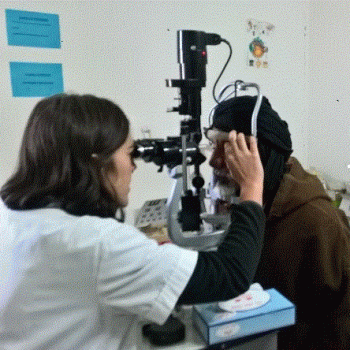Mónica Lecumberri is a Catalan ophthalmologist who graduated in medicine and surgery at the Autonomous University of Barcelona. Since becoming a volunteer in 2014, she has joined several of the ophthalmic expeditions Eyes of the world sends to the countries where a program is running. Dr. Lecumberri has travelled to places where people have lost their vision due to avoidable or treatable causes, helped train local professionals, and opened people’s eyes through surgical procedures.
Moreover, Dr. Lecumberri has often participated in the training courses the Foundation and Alcon organise in Barcelona as a speaker. In these training courses, Dr. Lecumberri taught the SICS technique to attending ophthalmologists.
As a professional ophthalmologist, Dr. Lecumberri works at the Hospitalet General Hospital as a member of the Consorci Sanitari Integral team of ophthalmologists.
Today, Dr. Lecumberri tells us about her experience as a member of the medical and surgical expeditions sent to the Sahrawi refugee camps in Tindouf, Algeria, and Mozambique:
Why did you decide to become a volunteer? And why did you choose Eyes of the world?
I have always been seduced by the idea of giving back by working in developing countries. So, when I graduated from medical school and became an ophthalmologist, I knew I would do it as soon as I had the opportunity.
I chose Eyes of the world because it is the benchmark organisation in the field of ophthalmic cooperation in Spain.
What would you highlight from your experience as a volunteer on the field?
I was extremely shocked by the lack of ophthalmologists in some parts of the world. Being able to work in those places where there is such a dire need for an ophthalmologist is very gratifying.
How does volunteering help you grow professionally and personally?
Professionally, volunteering has allowed me to develop skills to carry out my job with minimal resources. Personally, it has allowed me to learn and experience problems that are very real but very far from our own reality here in Spain.
Do you believe that the work Eyes of the world carries out is important? Why?
I believe it to be essential. Unfortunately, without the Foundation’s work there would be many more blind people in this world. On top of the surgical campaigns to remove cataracts, Eyes of the world—as any other NGO working for development—tries to focus on the training of local personnel and community eye health programmes. This work is vital to the eradication of, for example, trachoma or Vitamin A Deficiency.
Are you satisfied with the work you performed at the refugee camps? What balance do you make of the surgical expedition? And of local personnel?
My balance of surgical expeditions is always quite positive because they are very effective—you travel, operate on patients, and, practically on the next day, they can already see. It must be noted that the work that is being done at the Tindouf refugee camps would be impossible without the dedication of María Tavera, the Eyes of the Sahara programme coordinator. Regarding local personnel, there are all kinds of people like everywhere. You can find very motivated people who are willing to learn and people who just lack motivation and interest.
What quality do you think that is essential to volunteering?
First of all, empathy—being able to walk a mile in some else’s shoes and understand their needs. It is also important to respect the opinions of local personnel and not impose one’s way of doing things. Moreover, I think that having experience in the field one is going to work on is vital, as there are less resources and more complex pathologies there.
What would be your advice to someone who is considering volunteering but hasn’t decided yet?
I would tell them to make sure they have enough training to perform their job in a completely different setting and, if possible, to join a team of more experienced professionals the first time so that they may assume the responsibility of the most difficult cases.
